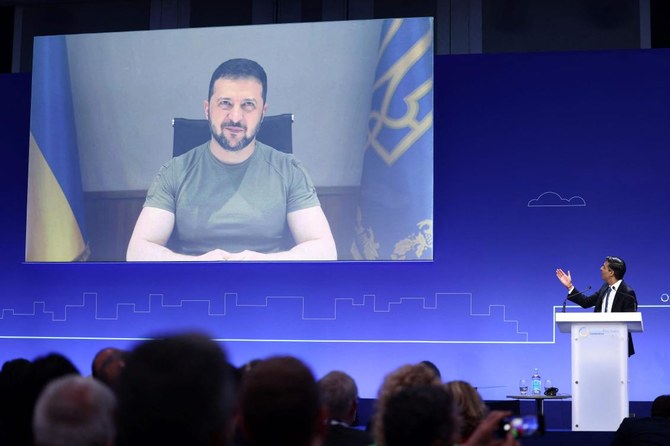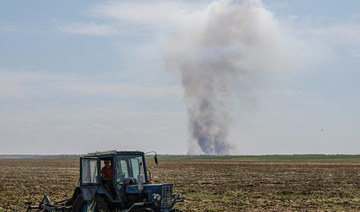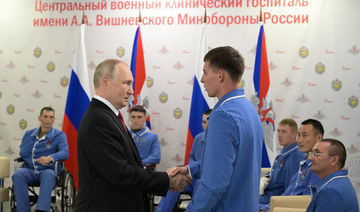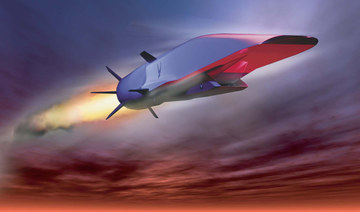LONDON: Western allies on Wednesday promised to make Russia pay for invading Ukraine as governments and private investors met to fund the country’s reconstruction from the ravages of war.
The World Bank has put an estimate of $14 billion on Ukraine’s immediate needs to repair the damage caused by the bitter fighting.
But a recent study by the World Bank, the UN, the European Union and the Ukrainian government said the wider recovery of the economy would cost $411 billion.
“Let’s be clear: Russia is causing Ukraine’s destruction,” US Secretary of State Antony Blinken told delegates at the London conference.
“And Russia will eventually bear the cost of Ukraine’s reconstruction,” he added.
UK Prime Minister Rishi Sunak voiced a similar message, promising to keep tough sanctions in place “until Russia pays up,” and to use seized assets to get Ukraine back on its feet.
In the conflict overnight, Russia said it had downed three Ukrainian drones in the Moscow region, while Ukraine said its air defense systems had shot down six Iranian-designed attack drones in the west.
Ukraine’s President Volodymyr Zelensky is overseeing a military fight-back using Western-supplied heavy weaponry to regain territory lost to Russian forces since last year.
“Every day of Russian aggression brings new ruins, thousands and thousands of destroyed houses, devastated industries, burnt lives,” he told the conference by video link.
But Zelensky set out his stall for future investment in Ukraine, saying that despite the devastation, the country was ripe for development in sectors from technology and green agriculture to clean energy.
“The world is watching to see if we will restore normal life in such a way that our transformation will land an ideological defeat on the aggressor,” he said.
“We protect Ukraine, and thus we protect freedom. And when we build Ukraine, we’ll build freedom.”
Leaders and representatives from more than 60 countries are attending the International Ukraine Recovery Conference 2023 — the second to be held since the Russian invasion in February last year.
The first, in Lugano, Switzerland, last July saw allies commit to supporting Ukraine through what is expected to be an eye-wateringly expensive and decades-long recovery.
African countries, though, have voiced concern that by pumping aid to Ukraine, the West is backing off from pledges to help the continent with development and fight climate change.
Sunak told delegates that Kyiv’s allies would support Ukraine “on the battlefield and beyond” for as long as it takes.
Zelensky underscored the need for long-term support. “Some people believe this is a Hollywood movie and expect results now,” he told the BBC in a separate interview.
“It’s not. What’s at stake is people’s lives,” he added.
Sunak has announced UK backing for Ukraine to the tune of $3 billion so it can unlock vital World Bank loans to help bolster public services, including schools and hospitals.
The guarantee will run over the next three years, he said. He also announced an extra £240 million ($306 million) in development aid funding for humanitarian projects.
European Commission president Ursula von der Leyen recapped the EU executive’s support package for Ukraine of 50 billion euros ($55 billion) over the next four years.
The European Union would soon outline how it intends to use proceeds from seized Russian assets, she added, “because the perpetrator has to be held accountable.”
Germany will provide 381 million euros in humanitarian assistance this year, Foreign Minister Annalena Baerbock said. Her French counterpart, Catherine Colonna announced 40 million euros.
The United States will provide more than $1.3 billion in additional aid, said Blinken, promising it would help Ukraine “rebuild its future.”
As well as government support from around the world, it is hoped more private-sector firms will join the reconstruction effort.
Delegates include captains of industry from major multinationals and corporations, many of whom have signed up to a new Ukraine Business Compact.
It encourages trade, investment and expertise-sharing to Ukraine on the back of promises from Zelensky to tackle barriers such as corruption and financial and legal transparency.
More than 400 companies from 38 countries, with a combined market capitalization of $4.9 trillion, have already promised to back Ukraine’s recovery and reconstruction, Sunak said.
A new London-based insurance scheme would help to underwrite risky investments in Ukraine, he said, “removing one of the biggest barriers and giving investors the confidence they need to act.”
Kyiv’s allies vow to make Russia pay for Ukraine invasion
https://arab.news/b4bf9
Kyiv’s allies vow to make Russia pay for Ukraine invasion

- The World Bank has put an estimate of $14 billion on Ukraine's immediate needs to repair the damage caused by the bitter fighting
- "Let's be clear: Russia is causing Ukraine's destruction," US Secretary of State Antony Blinken told delegates at the London
UN reports improved prospects for the world economy and forecasts 2.7 percent growth in 2024

- The mid-2024 report says the world economy is now projected to grow by 2.7 percent this year and by 2.8 percent in 2025
UNITED NATIONS: The United Nations reported improved prospects for the world economy since its January forecast on Thursday, pointing to a better outlook in the United States and several large emerging economies including Brazil, India and Russia.
According to its mid-2024 report, the world economy is now projected to grow by 2.7 percent this year – up from the 2.4 percent forecast in its January report – and by 2.8 percent in 2025. A 2.7 percent growth rate would equal growth in 2023, but still be lower than the 3 percent growth rate before the COVID-19 pandemic began in 2020.
“Our prognosis is one of guarded optimism, but with important caveats,” Shantanu Mukherjee, director of the UN’s Economic Analysis and Policy Division, told a news conference launching the report.
The report pointed to interest rates that are higher for longer periods, debt repayment challenges, continuing geopolitical tensions and climate risks especially for the world’s poorest countries and small island nations.
Mukherjee said inflation, which is down from its 2023 peak, is both “a symptom of the underlying fragility” of the global economy where it still lurks, “but also a cause for concern in its own right.”
“We’ve seen that in some countries inflation continues to be high,” he said. “Globally, energy and food prices are inching upward in recent months, but I think a bit more insidious even is the persistence of inflation above the 2 percent central bank target in many developed countries.”

The UN forecast for 2024 is lower than those of both the International Monetary Fund and the Organization for Economic Cooperation and Development.
In mid-April, the IMF forecast that the world economy would continue growing at 3.2 percent during 2024 and 2025, the same pace as in 2023. And the OECD in early May forecast 3.1 percent growth in 2024 and 3.2 percent in 2025.,
The latest UN estimates foresee 2.3 percent growth in the United States in 2024, up from 1.4 percent forecast at the start of the year, and a small increase for China from 4.7 percent in January to 4.8 percent. for the year.
Despite climate risks, the report by the UN Department of Economic and Social Affairs forecasts improved economic growth from 2.4 percent in 2023 to 3.3 percent in 2024 for the small developing island nations primary due to a rebound in tourism.
On a negative note, the report projects that economic growth in Africa will be 3.3 percent, down from 3.5 percent forecast at the beginning of 2024. It cited weak prospects in the continent’s largest economies – Egypt, Nigeria and South Africa – along with seven African countries “in debt distress” and 13 others at “high risk of debt distress.”
Mukherjee said the lower forecast for Africa “is particularly worrying because Africa is home to about 430 million (people) living in extreme poverty and close to 40 percent share of the global undernourished population” and “two-thirds of the high inflation countries listed in our update are also in Africa.”
For developing countries, he said, the situation isn’t “as dire” but an important concern is the continuing fall and sharp decline in investment growth.
Japan, US move ahead in co-developing hypersonic weapons interceptor as regional threats grow

TOKYO: Japan and the United States on Wednesday signed an arrangement to jointly develop a new type of missile defense system as the allies seek to defend against the growing threat of hypersonic weapons, which are possessed by China and Russia and being tested by North Korea.
The project was initially agreed between Japan’s Prime Minister Fumio Kishida and US President Joe Biden at their summit last August and reaffirmed between the leaders during Kishida’s April visit to Washington. The Glide Phase Interceptor is planned for deployment by the mid-2030s.
Wednesday’s agreement determines the allocation of responsibility and decision-making process, a first major step in the project, Japanese defense ministry officials said. They hope to decide on Japanese contractors and start the development process by March 2025.
Hypersonic weapons are designed to exceed Mach 5, or five times the speed of sound, posing a threat to regional missile-defense systems with their speed and maneuverability. Developing interceptors of them is a challenge.

Japan’s defense ministry called it a “pressing issue” and noted that hypersonic weapons in the region have dramatically improved in recent years.
Under the arrangement, Japan is responsible for developing a part at the interceptor’s tip that separates in space to destroy the incoming warhead, as well as its rocket motors, officials said.
Japan has earmarked 75.7 billion yen ($490 million) for initial development and testing of the interceptor, according to the defense ministry.
The cost includes making components for the two companies, Raytheon Technologies and Northrop Grumman, that are developing the weapon in a competition led by the US Missile Defense Agency. One will be chosen for the project.
The MDA has estimated the cost to develop the hypersonic missile interceptor will exceed $3 billion, including Japan’s share of $1 billion.
The interceptors will be deployed on Aegis-class destroyers, like the ship-to-air Standard Missile-3 that Japan previously co-developed with the United States.
Japan has been accelerating its miliary buildup as it stresses the need to fortify its deterrence against growing threats. Japan has also significantly eased its weapons export policy to allow co-developed lethal weapons to third countries.
___
This story has been corrected to say GPI stands for Glide Phase Interceptor, not Glide Sphere Interceptor.
___
Follow AP’s Asia-Pacific news at https://apnews.com/hub/asia-pacific
Using frozen Russian assets for Ukraine must align with law, Japan says

TOKYO: Japanese Finance Minister Shunichi Suzuki said on Friday it is important that discussions will be aligned with international law when asked about a US proposal for using the interest derived from frozen Russian assets to aid Ukraine.
“Japan plans to join the discussions at the upcoming Group of Seven meeting from this basic standpoint,” Suzuki said.
Senegalese prime minister criticizes French military bases on territory

- “I reiterate here the desire of Senegal to have its own control, which is incompatible with the lasting presence of foreign military bases in Senegal," PM Sonko said
- Neighbours Mali, Burkina Faso and Niger have pushed out French troops and turned to Russia for help fighting jihadist insurgencies on their territory
DAKAR: Senegal’s prime minister Ousmane Sonko raised the possibility of closing French military bases in the West African country on Thursday in a wide-ranging speech that also touched on the euro-backed CFA franc currency, oil and gas deals and LGBTQ rights.
Sonko, a firebrand politician who gained power when his hand-picked presidential candidate Bassirou Diomaye Faye won a decisive victory in March, is known for criticizing perceived overreach by France in its former colony.
France has about 350 troops in Senegal.
“More than 60 years after our independence ... we must question the reasons why the French army for example still benefits from several military bases in our country and the impact of this presence on our national sovereignty and our strategic autonomy,” Sonko said at a joint conference with the French left-wing politician Jean-Luc Melenchon in the capital Dakar.
“I reiterate here the desire of Senegal to have its own control, which is incompatible with the lasting presence of foreign military bases in Senegal ... Many countries have promised defense agreements, but this does not justify the fact that a third of the Dakar region is now occupied by foreign garrisons.”
Neighbours Mali, Burkina Faso and Niger have pushed out French troops and turned to Russia for help fighting jihadist insurgencies on their territory.
They have also turned away from West African bloc ECOWAS — which condemned their coups — and formed their own alliance of Sahel states.
But Sonko had friendly words for them on Thursday.
“We will not let go of our brothers in the Sahel and we will do everything necessary to strengthen the ties,” he said.
He also said Senegal, which shares the euro-pegged CFA franc currency with seven countries, would like a flexible currency pegged to at least two currencies to help absorb shocks and support export competitiveness.
During the election campaign, Faye had initially pledged to abandon the CFA franc but later backed off his promise.
Sonko reiterated promises to renegotiate oil and gas contracts in Senegal, where production is due to begin this year.
He also called on Western countries to show “restraint, respect, reciprocity and tolerance” on social matters including LGBTQ rights and gender equality.
He said homosexuality had always existed in Senegal, but the country had “managed” it and would continue to do so according to its socio-cultural realities.
“Senegal and many other African countries cannot accept any truth in legalizing this phenomenon.”
China and Russia reaffirm their close ties as Moscow presses its offensive in Ukraine

- Putin and Xi said they were seeking an end to the war in Ukraine, but they offered no new proposals in their public remarks
- China claims to take a neutral position in the conflict, but continues to supply key components needed by Moscow for weapons production
BEIJING: Russian President Vladimir Putin and Chinese leader Xi Jinping on Thursday reaffirmed their “no-limits” partnership that has deepened as both countries face rising tensions with the West, and they criticized US military alliances in Asia and the Pacific region.
At their summit in Beijing, Putin thanked Xi for China’s proposals for ending the war in Ukraine, which have been rejected by Ukraine and its Western supporters as largely following the Kremlin’s line.
Putin’s two-day state visit to one of his strongest allies and trading partners comes as Russian forces are pressing an offensive in northeastern Ukraine’s Kharkiv region in the most significant border incursion since the full-scale invasion began on Feb. 24, 2022.
China claims to take a neutral position in the conflict, but it has backed the Kremlin’s contentions that Russia was provoked into attacking Ukraine by the West, and it continues to supply key components needed by Moscow for weapons production.
China, which hasn’t criticized the invasion, proposed a broadly worded peace plan in 2023, calling for a ceasefire and for direct talks between Moscow and Kyiv. The plan was rejected by both Ukraine and the West for failing to call for Russia to leave occupied parts of Ukraine.
China also gave a rhetorical nod to Russia’s narrative about Nazism in Ukraine, with a joint statement Thursday that said Moscow and Beijing should defend the post-World War II order and “severely condemn the glorification of or even attempts to revive Nazism and militarism.”
Putin has cited the “denazification” of Ukraine as a main goal of the military action, falsely describing the government of Ukrainian President Volodymyr Zelensky, who is Jewish and lost relatives in the Holocaust, as neo-Nazis.
The largely symbolic and ceremonial visit stressed partnership between two countries who both face challenges in their relationship with the US and Europe.
“Both sides want to show that despite what is happening globally, despite the pressure that both sides are facing from the US, both sides are not about to turn their backs on each other anytime soon,” said Hoo Tiang Boon, who researches Chinese foreign policy at Singapore’s Nanyang Technological University.
While Putin and Xi said they were seeking an end to the war, they offered no new proposals in their public remarks.
“China hopes for the early return of Europe to peace and stability and will continue to play a constructive role toward this,” Xi said in prepared remarks to media in Beijing’s Great Hall of the People. His words echoed what China said when it offered a broad plan for peace.
Earlier, Putin was welcomed in Tiananmen Square with military pomp. After a day in Beijing, the Russian leader arrived in Harbin, where he was expected to attend a number of events on Friday.
On the eve of his visit, Putin said China’s proposal could “lay the groundwork for a political and diplomatic process that would take into account Russia’s security concerns and contribute to achieving a long-term and sustainable peace.”
Zelensky has said any negotiations must include a restoration of Ukraine’s territorial integrity, the withdrawal of Russian troops, the release of all prisoners, a tribunal for those responsible for the aggression and security guarantees for Ukraine.
After Russia’s latest offensive in Ukraine last week, the war is in a critical stage as Ukraine’s depleted military waits for new supplies of anti-aircraft missiles and artillery shells from the United States after months of delay.
The joint statement from China and Russia also criticized US foreign policy at length, hitting out at US-formed alliances, which the statement called having a “Cold War mentality.”
China and Russia also accused the US of deploying land-based intermediate range missile systems in the Asia-Pacific under the pretext of joint exercises with allies. They said that the US actions in Asia were “changing the balance of power” and “endangering the security of all countries in the region.”
The joint statement demonstrated China’s support to Russia.
China is “falling over themselves to give Russia face and respect without saying anything specific, and without committing themselves to anything,” said Susan Thornton, a former diplomat and a senior fellow at the Paul Tsai China Center at Yale Law School.
The meeting was yet another affirmation of the friendly “no-limits” relationship China and Russia signed in 2022, just before Moscow invaded Ukraine.
Since then, Russia has become increasingly dependent economically on China as Western sanctions cut its access to much of the international trading system. China’s increased trade with Russia, totaling $240 billion last year, has helped the country mitigate some of the worst blowback from sanctions.
Moscow has diverted the bulk of its energy exports to China and relied on Chinese companies for importing high-tech components for Russian military industries to circumvent Western sanctions.
“I and President Putin agree we should actively look for convergence points of the interests of both countries, to develop each’s advantages, and deepen integration of interests, realizing each others’ achievements,” Xi said.
US State Department deputy spokesperson Vedant Patel said that China can’t “have its cake and eat it too.
“You cannot want to have deepened relations with Europe … while simultaneously continuing to fuel the biggest threat to European security in a long time,” Patel said.
Xi congratulated Putin on starting his fifth term in office and celebrated the 75th anniversary of diplomatic relations between the former Soviet Union and the People’s Republic of China, which was established following a civil war in 1949. Putin has eliminated all major political opponents and faced no real challenge in the March election.
“In a famous song of that time, 75 years ago — it is still performed today — there is a phrase that has become a catchphrase: ‘Russians and Chinese are brothers forever,’” Putin said.
Russia-China military ties have strengthened during the war. They have held a series of joint war games in recent years.
China remains a major market for Russian military, while also massively expanding its domestic defensive industries, including building aircraft carriers and nuclear submarines.
Putin has previously said that Russia has been sharing highly sensitive military technologies with China that helped significantly bolster its defense capability.






















